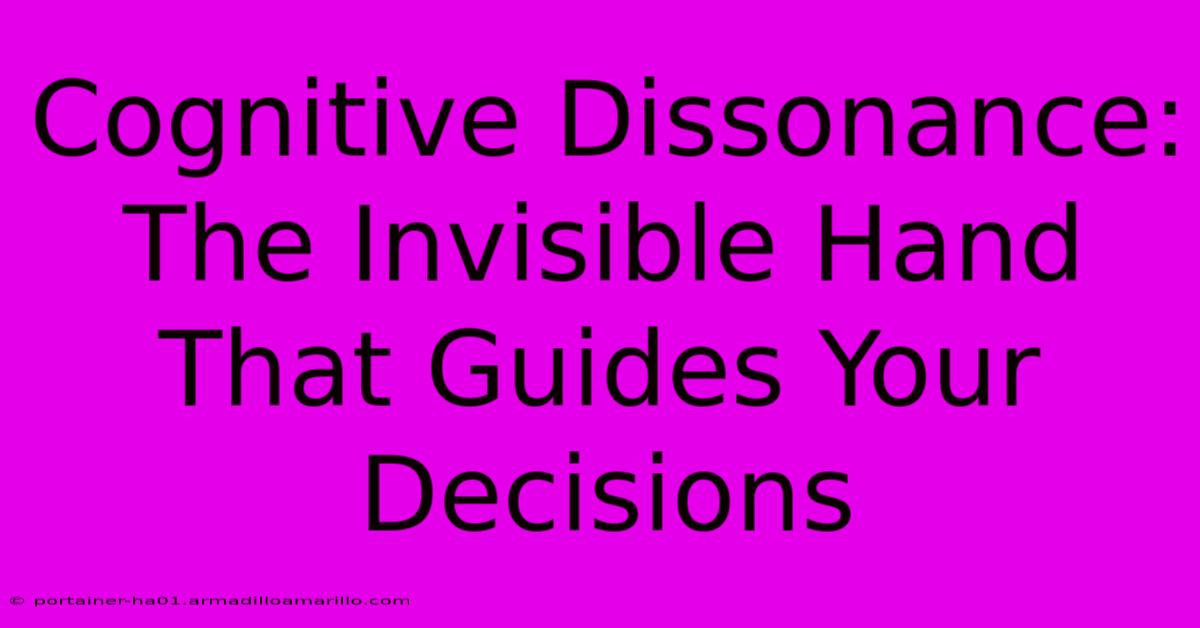Cognitive Dissonance: The Invisible Hand That Guides Your Decisions

Table of Contents
Cognitive Dissonance: The Invisible Hand That Guides Your Decisions
We make thousands of decisions every day, from the mundane (what to have for breakfast) to the monumental (choosing a career path). But what if I told you there's a powerful, often unseen force subtly shaping these choices? That force is cognitive dissonance, and understanding it can unlock a deeper understanding of your own behavior and the behavior of others.
What is Cognitive Dissonance?
Cognitive dissonance, a concept pioneered by Leon Festinger, describes the mental discomfort experienced when holding two or more conflicting beliefs, ideas, or values. This discomfort isn't a fleeting feeling; it's a powerful motivator that drives us to reduce the tension and restore consistency in our thinking. Think of it as your brain's internal conflict resolution system.
Imagine you're a strong advocate for environmental protection, but you regularly drive a gas-guzzling SUV. This creates dissonance: your actions contradict your beliefs. To alleviate this discomfort, your brain will likely employ various strategies.
Strategies to Reduce Cognitive Dissonance
The ways we resolve cognitive dissonance are fascinating and often revealing. Common strategies include:
- Changing our beliefs: You might downplay the importance of fuel efficiency or convince yourself that the environmental impact of your SUV is negligible.
- Changing our behavior: You might decide to sell your SUV and buy a more fuel-efficient vehicle, aligning your actions with your beliefs.
- Adding new cognitions: You might justify your SUV by arguing that you need it for safety or hauling large items, adding a new belief to rationalize your behavior.
- Minimizing the importance of the conflict: You might simply decide that environmental protection isn't as important as you previously thought.
These strategies, while seemingly rational, can sometimes lead to irrational behavior. This is because the drive to reduce dissonance often overrides logical thinking.
Examples of Cognitive Dissonance in Everyday Life
Cognitive dissonance is far more pervasive than you might think. It subtly influences our decisions in countless ways:
- Buyer's remorse: After purchasing an expensive item, you might experience dissonance if you later question its value or find a cheaper alternative. To reduce this dissonance, you might convince yourself that the item was worth the price or focus on its positive aspects.
- Relationship conflicts: Staying in a dysfunctional relationship despite knowing it's harmful can stem from cognitive dissonance. The desire to maintain the relationship conflicts with the knowledge of its negativity.
- Health behaviors: Continuing to smoke despite knowing the health risks is a classic example. The pleasure derived from smoking clashes with the awareness of its dangers.
- Political beliefs: Holding strong political beliefs and then encountering evidence that contradicts those beliefs can lead to significant dissonance. Individuals often dismiss contradictory information or find ways to reinterpret it to maintain their existing beliefs.
The Power of Cognitive Dissonance in Marketing and Persuasion
Understanding cognitive dissonance is a valuable tool in marketing and persuasion. Marketers often leverage this principle by creating a sense of dissonance in consumers, then offering their product or service as a solution. For instance, highlighting the negative consequences of not using a particular product can create the necessary tension that drives consumers towards a purchase.
Overcoming Cognitive Dissonance: A Path to Self-Awareness
While cognitive dissonance is a natural human process, becoming aware of its influence can empower you to make more conscious and rational decisions. By recognizing the dissonance you experience and critically examining the strategies you employ to resolve it, you can break free from its often-unconscious grip. This self-awareness can lead to greater self-understanding and more aligned actions.
Keywords: Cognitive dissonance, Leon Festinger, decision making, mental discomfort, conflict resolution, buyer's remorse, marketing, persuasion, self-awareness, rational behavior, irrational behavior, belief change, behavior change, health behaviors, political beliefs, relationship conflicts.

Thank you for visiting our website wich cover about Cognitive Dissonance: The Invisible Hand That Guides Your Decisions. We hope the information provided has been useful to you. Feel free to contact us if you have any questions or need further assistance. See you next time and dont miss to bookmark.
Featured Posts
-
Revolutionize Your Email Aesthetics The Ultimate Guide To Transition Images
Feb 07, 2025
-
Raskryt Genialniy Sekret Sozdaniya Fotografiy Idealnogo Razmera
Feb 07, 2025
-
Transform Your Passivity Into Action Discover The Secrets Of Passive To Active Conversion
Feb 07, 2025
-
Batch Processing Paradise Automators Automated Image Resolution Solutions
Feb 07, 2025
-
From Scarlet To Indigo Dive Into The Chromatic Spectrum Of The Human Psyche
Feb 07, 2025
